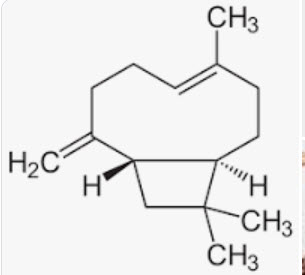
β-caryophyllene (bcp), a natural bicyclic sesquiterpene, is a selective phytocannabinoid agonist of type 2 receptors (cb2-r). it isn’t psychogenic due to the absence of an affinity to cannabinoid receptor type 1 (cb1). among the various biological activities, bcp exerts anti-inflammatory action via inhibiting the main inflammatory mediators, such as inducible nitric oxide synthase (inos), interleukin 1 beta (il-1β), interleukin-6 (il-6), tumor necrosis factor-alfa (tnf-α), nuclear factor kapp a-light-chain-enhancer of activated b cells (nf-κb), cyclooxygenase 1 (cox-1), cyclooxygenase 2 (cox-2). peroxisome proliferator-activated receptors alpha (ppar-α) effects are also mediated by the activation of ppar-α and ppar-γ receptors. in detail, many studies, in vitro and in vivo, suggest that the treatment with β-caryophyllene improves the phenotype of animals used to model various inflammatory pathologies, such as nervous system diseases (parkinson’s disease, alzheimer’s disease, multiple sclerosis, amyotrophic lateral sclerosis, stroke), atherosclerosis, and tumours (colon, breast, pancreas, lymphoma, melanoma and glioma cancer). furthermore, pre-clinical data have highlighted that bcp is potentially useful in streptococcus infections, osteoporosis, steatohepatitis, and exerts anticonvulsant, analgesic, myorelaxing, sedative, and antidepressive effects. bcp is non-toxic in rodents, with a lethal dose, 50% (ld50) greater than 5000 mg/kg. nevertheless, it inhibits various cytochrome p450 isoforms (above all, cyp3a4), which metabolise xenobiotics, leading to adverse effects, due to drug levels over therapeutic window. all the reported data have highlighted that both pharmacological and toxicological aspects need to be further investigated with clinical trials.
